Thomas James Richards, Diaries, Transcript Vol. 1, 26 August 1914 to 24 April 1915 - Part 8
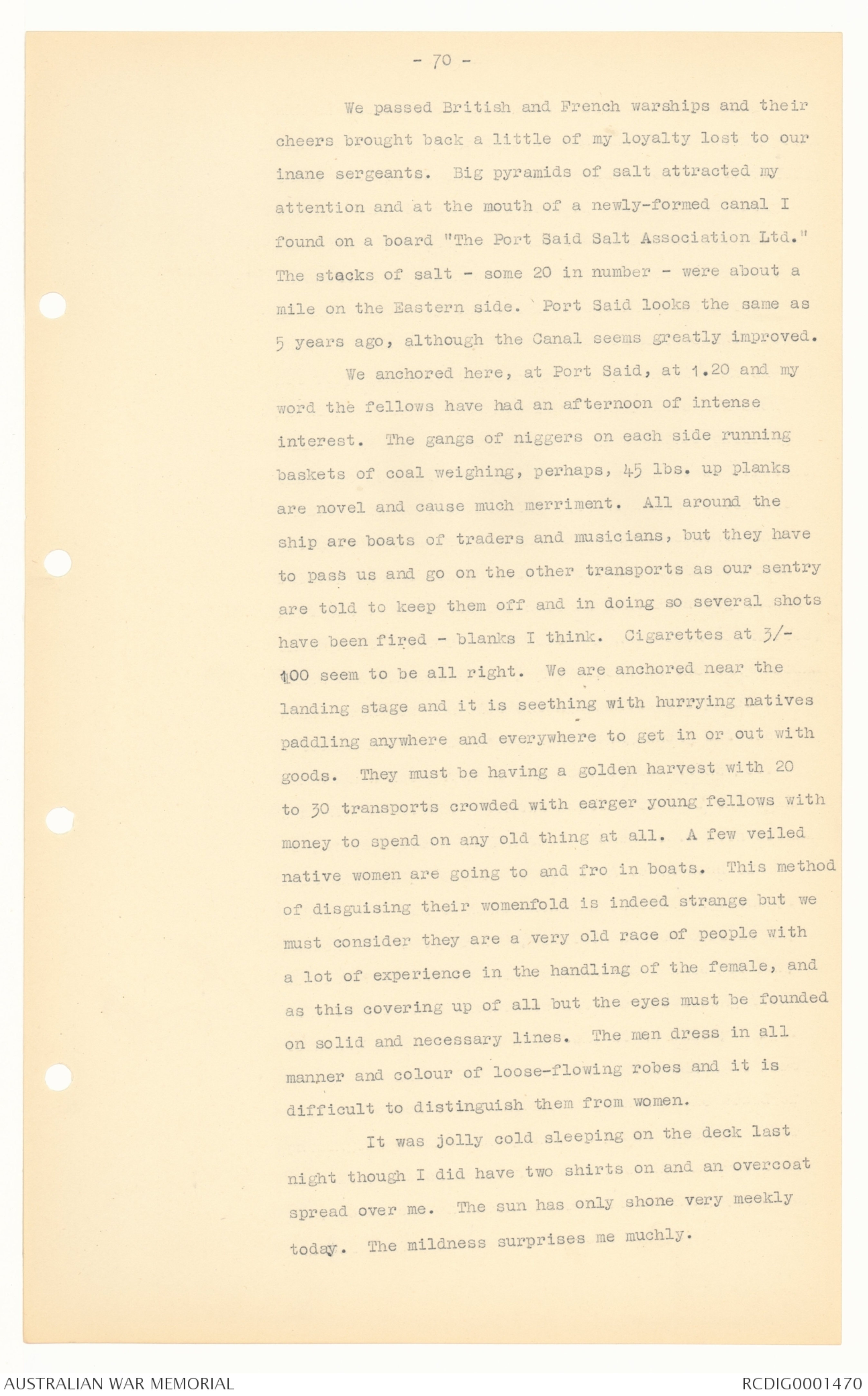
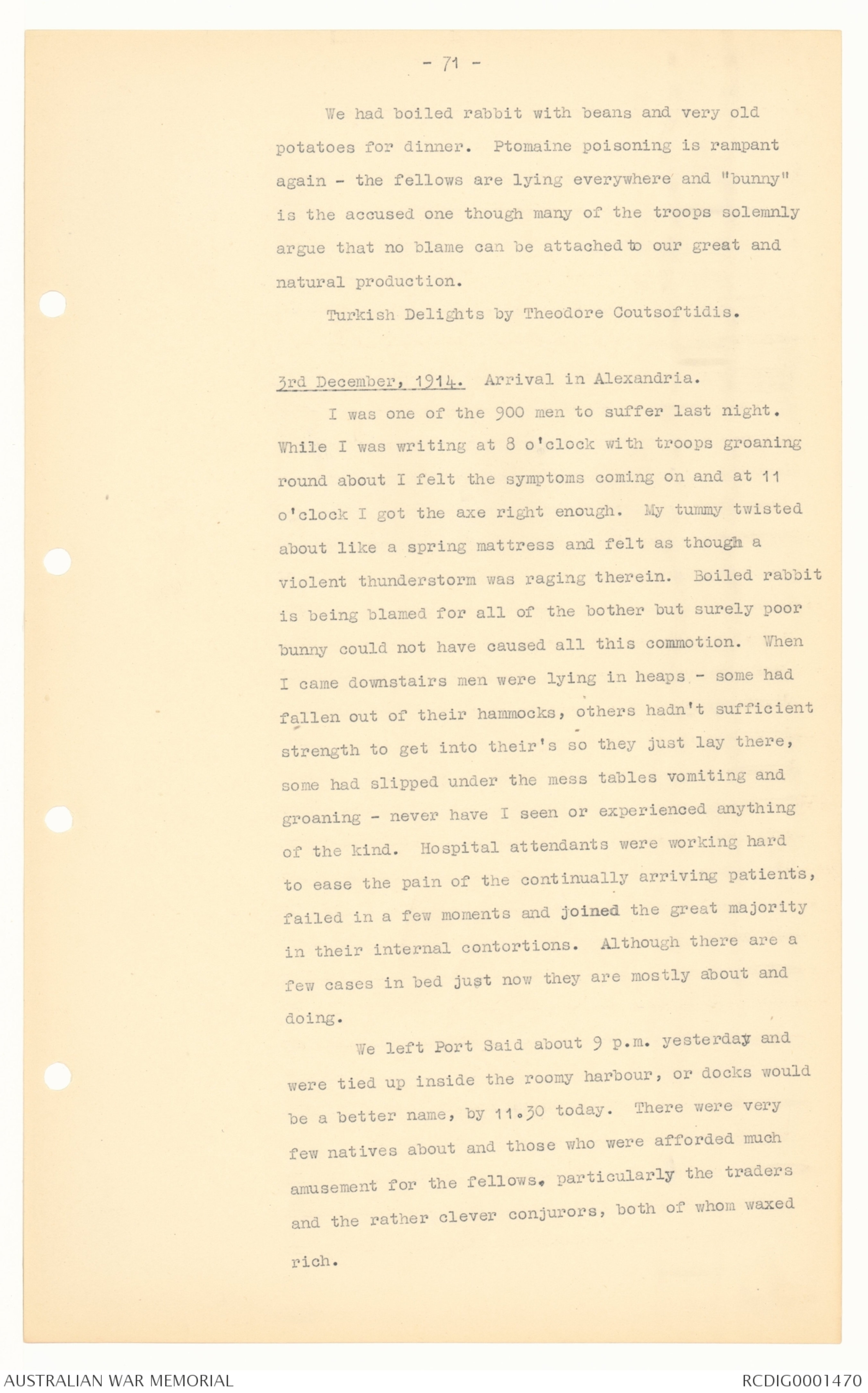
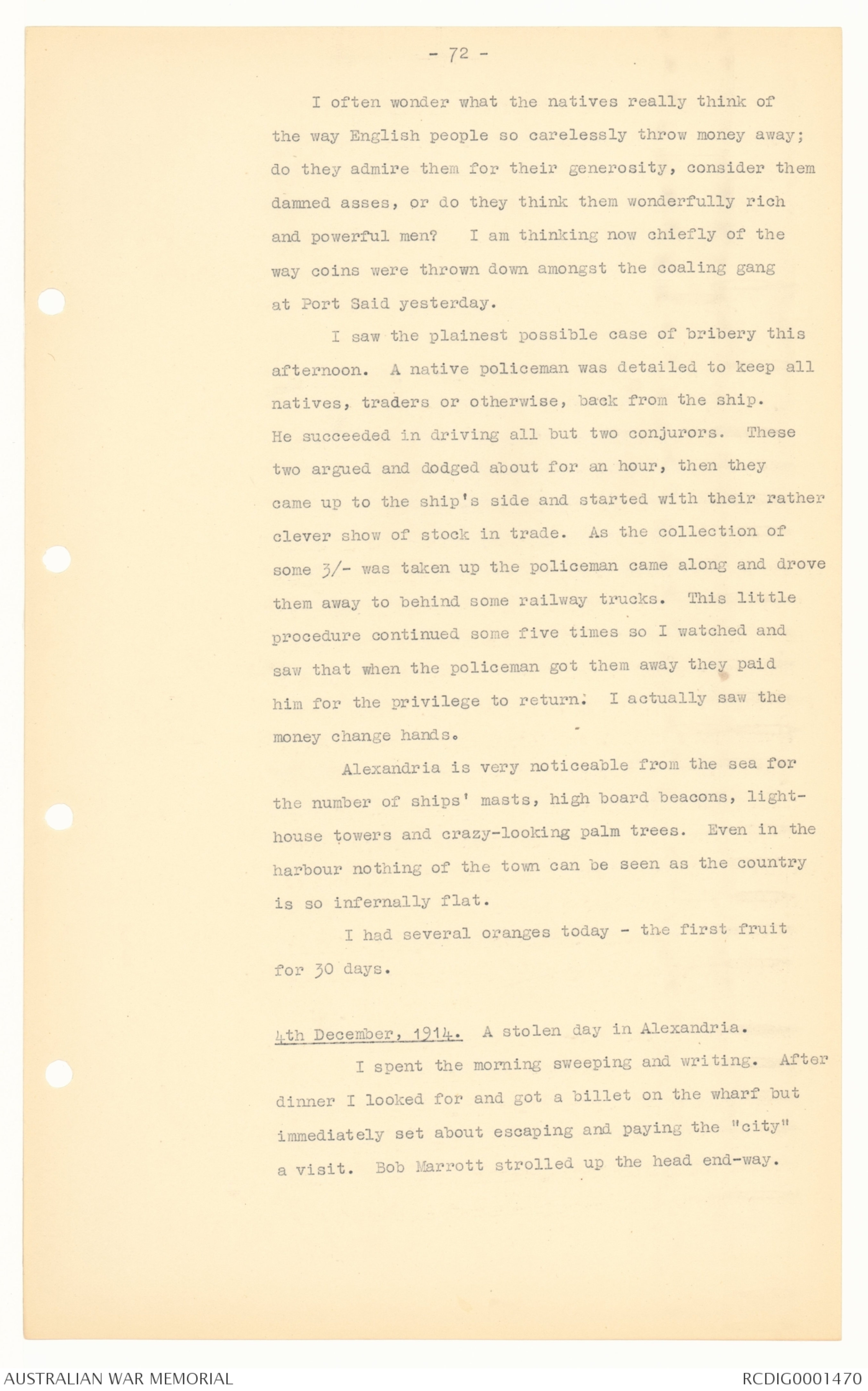
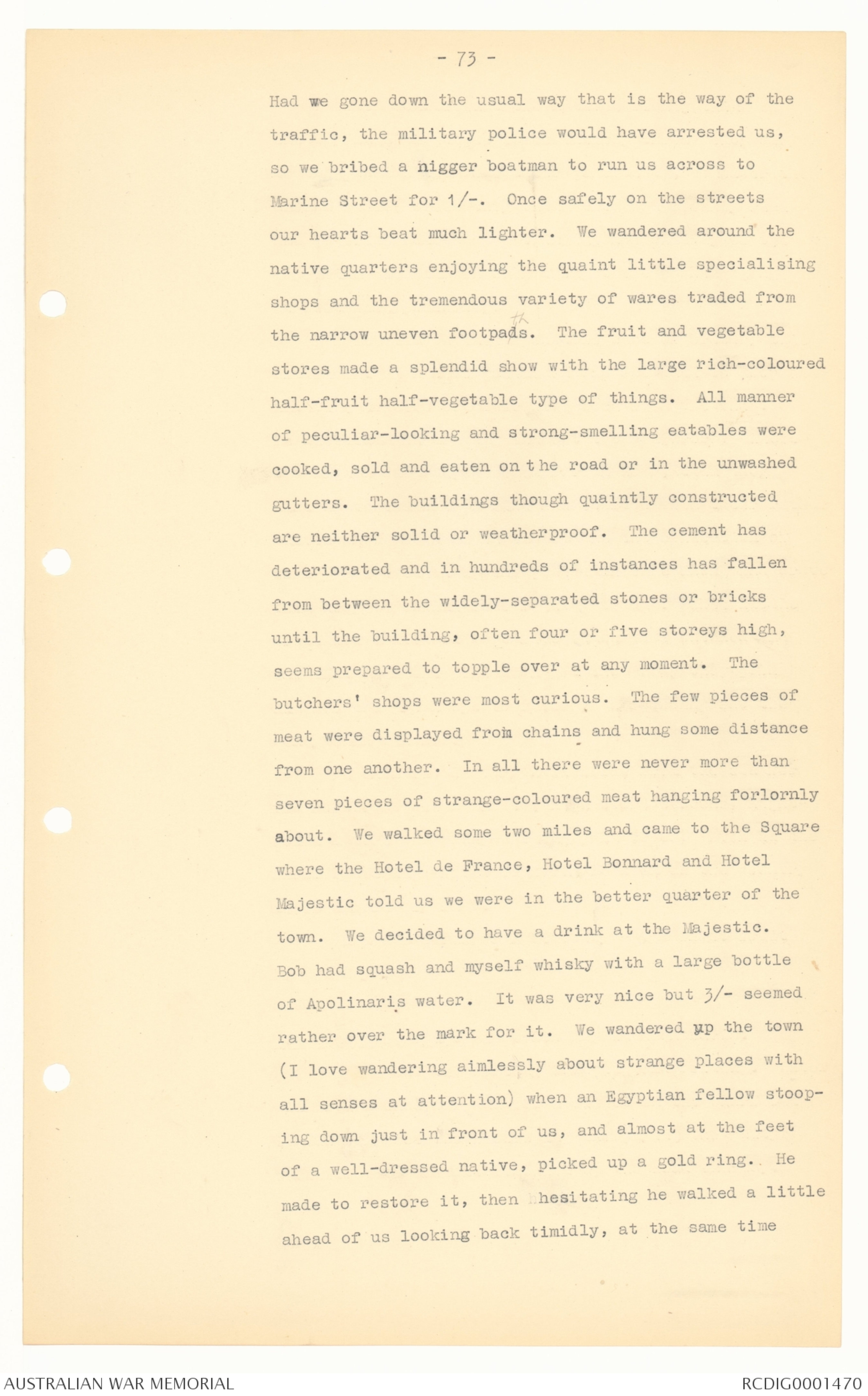
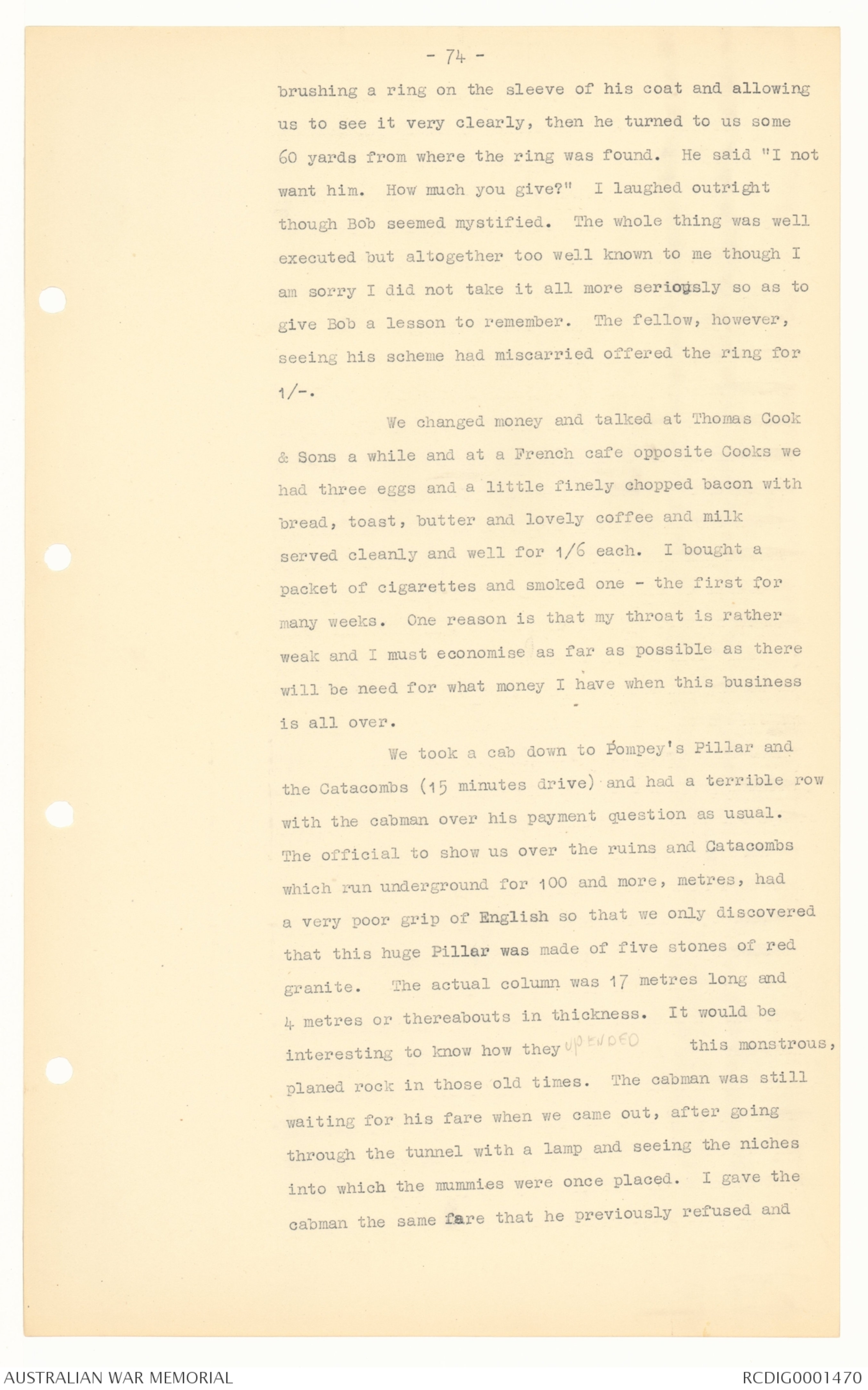
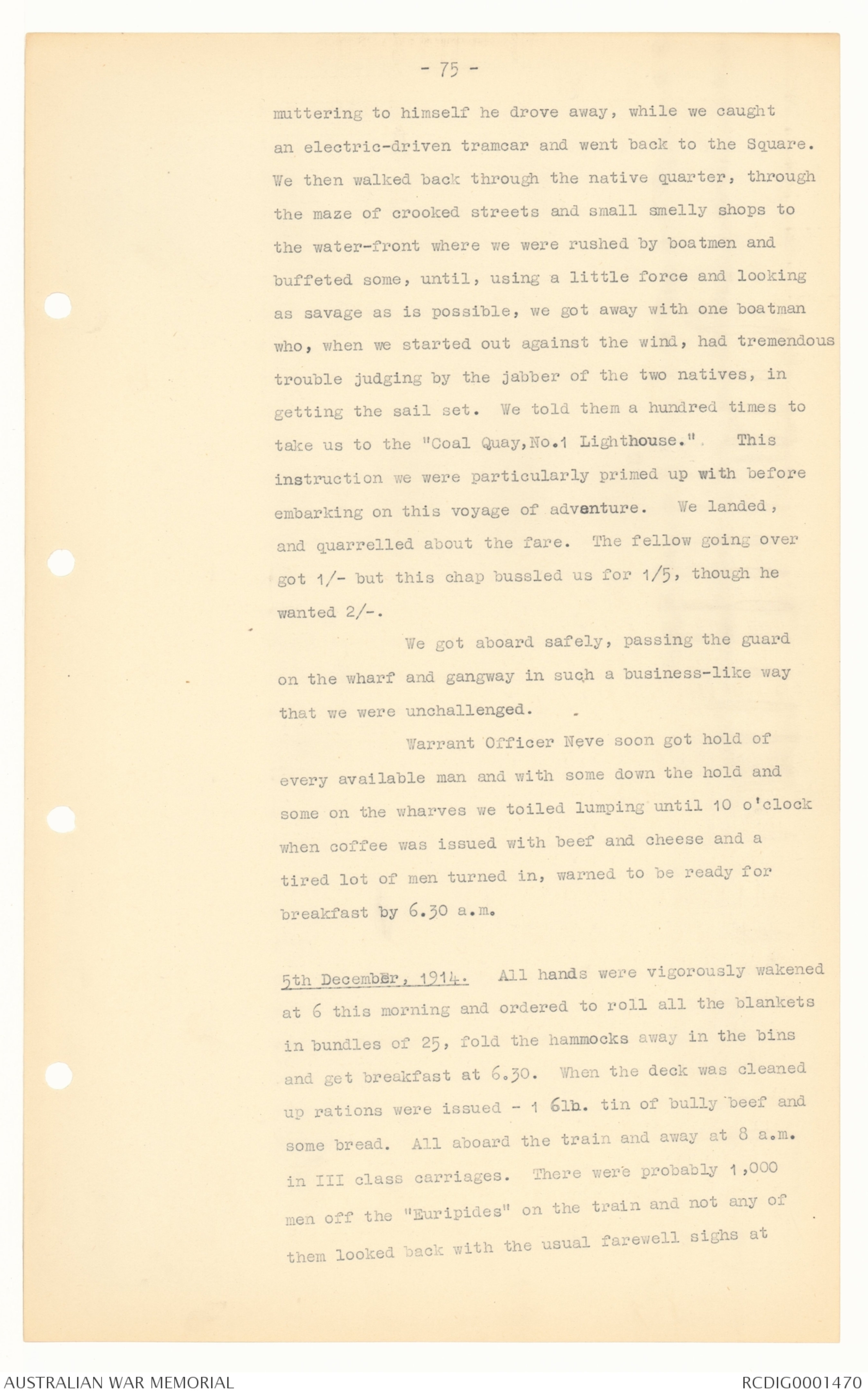
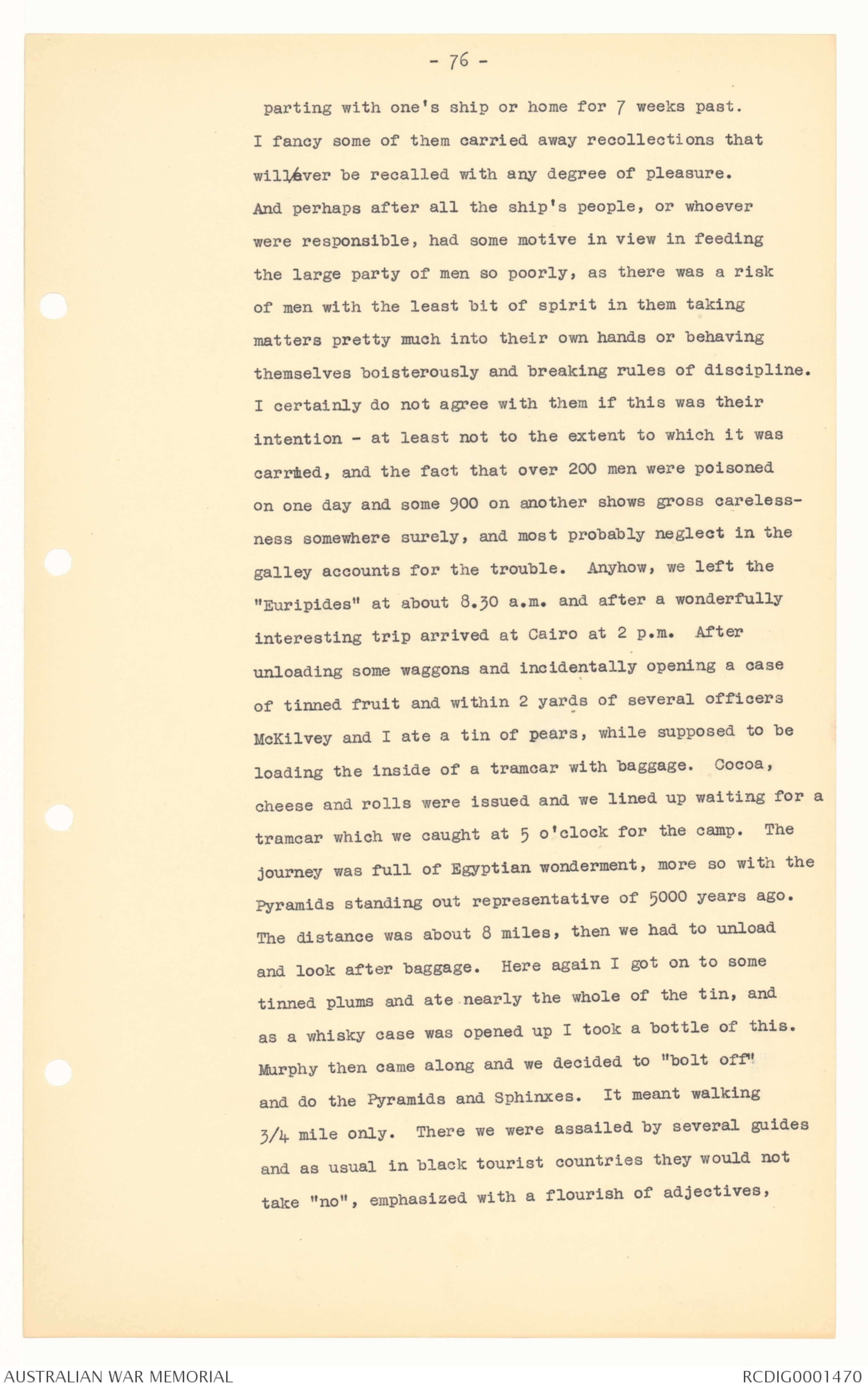
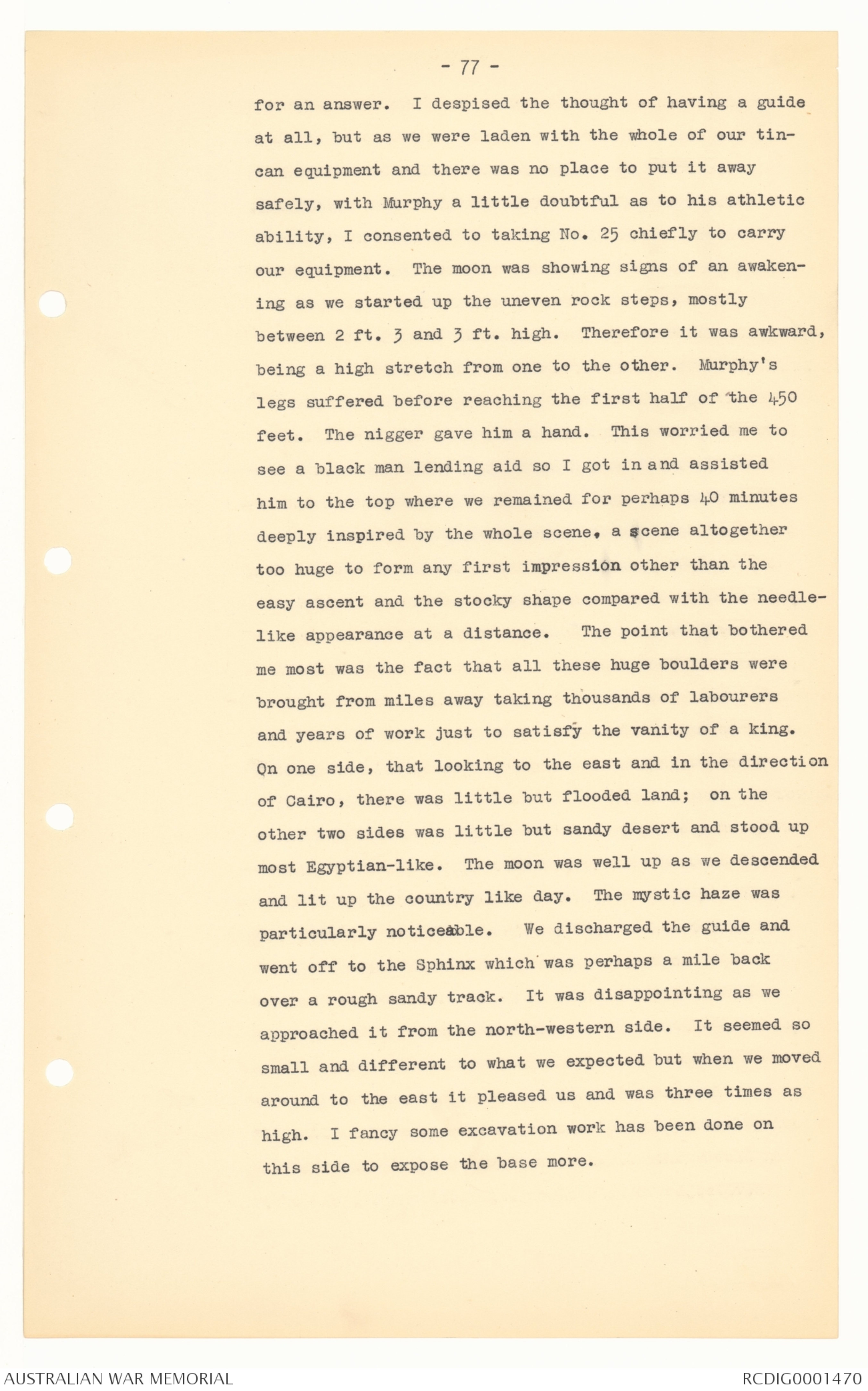
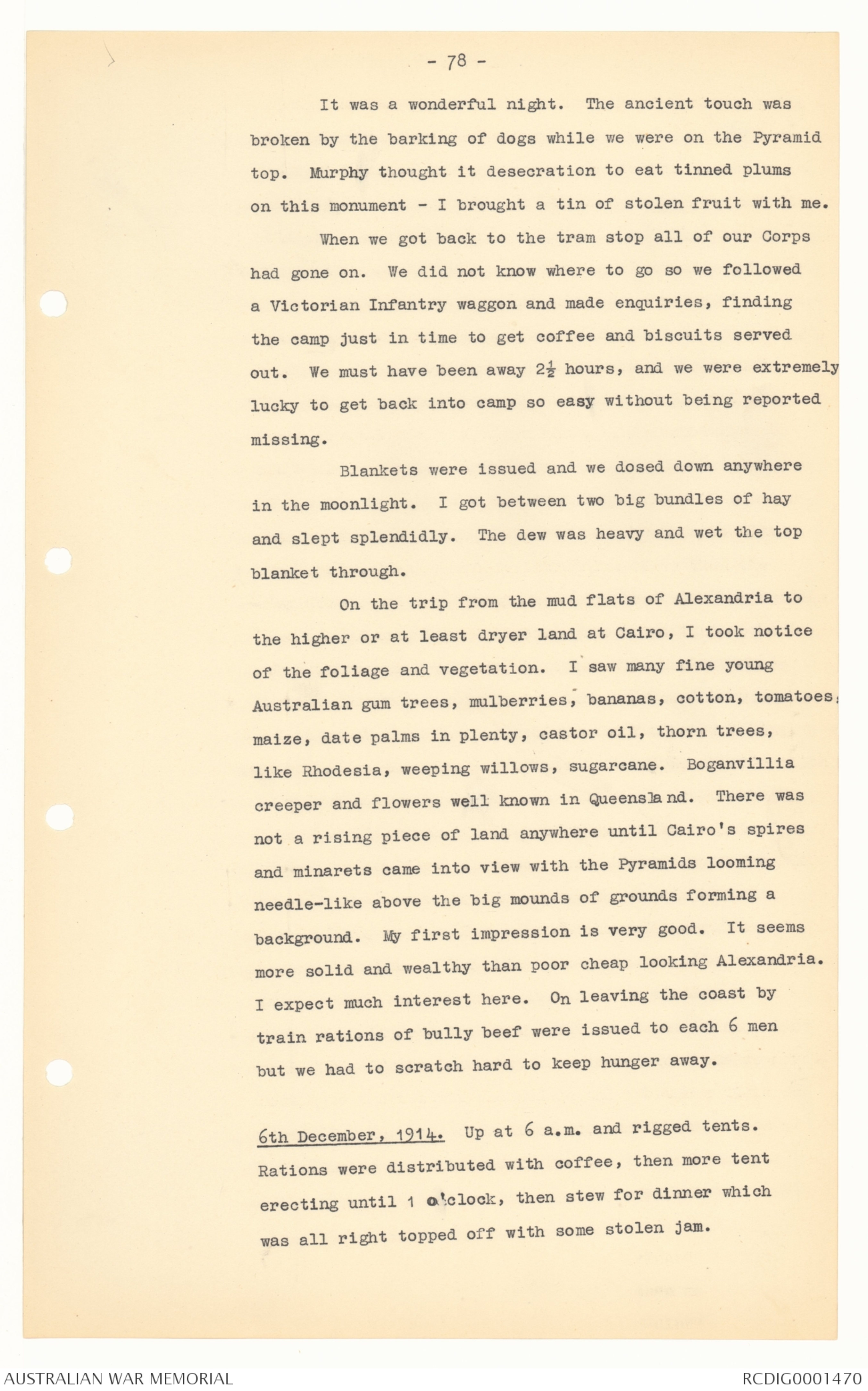
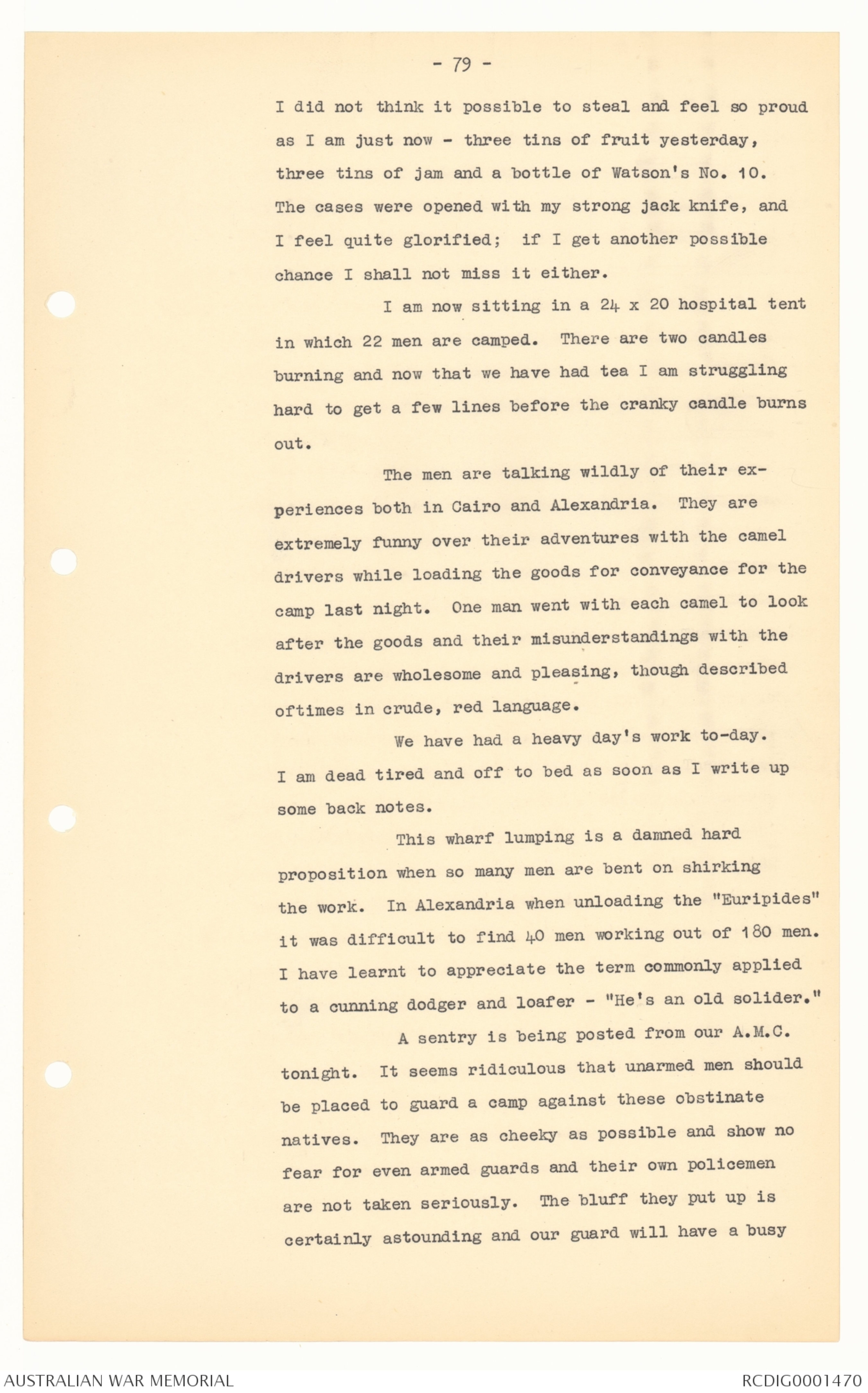
-70-
We passed British and French warships and their
cheers brought back a little of my loyalty lost to our
inane sergeants. Big pyramids of salt attracted my
attention and at the mouth of a newly-formed canal I
found on a board "The Port Said Salt Association Ltd."
The stacks of salt - some 20 in number - were about a
mile on the Eastern side. Port Said looks the same as
5 years ago, although the Canal seems greatly improved.
We anchored here, at Port Said, at 1.20 and my
word the fellows have had an afternoon of intense
interest. The gangs of niggers on each side running
baskets of coal weighing, perhaps, 45 1bs. up planks
are novel and cause much merriment. All around the
ship are boats of traders and musicians, but they have
to pass us and go on the other transports as our sentry
are told to keep them off and in doing so several shots
have been fired - blanks I think. Cigarettes at 3/-
100 seem to be all right. We are anchored near the
landing stage and it is seething with hurrying natives
paddling anywhere and everywhere to get in or out with
goods. They must be having a golden harvest with 20
to 30 transports crowded with earger young fellows with
money to spend on any old thing at all. A few veiled
native women are going to and fro in boats. This method
of disguising their womenfold is indeed strange but we
must consider they are a very old race of people with
a lot of experience in the handling of the female, and
as this covering up of all but the eyes must be founded
on solid and necessary lines. The men dress in all
manner and colour of loose-flowing robes and it is
difficult to distinguish them from women.
It was jolly cold sleeping on the deck last
night though I did have two shirts on and an overcoat
spread over me. The sun has only shone very meekly
today. The mildness surprises me muchly.
-71-
We had boiled rabbit with beans and very old
potatoes for dinner. Ptomaine poisoning is rampant
again - the fellows are lying everywhere and "bunny"
is the accused one though many of the troops solemnly
argue that no blame can be attached to our great and
natural production.
Turkish Delights by Theodore Coutsoftidis.
3rd December, 1914. Arrival in Alexandria.
I was one of the 900 men to suffer last night.
While I was writing at 8 o'clock with troops groaning
round about I felt the symptoms coming on and at 11
o'clock I got the axe right enough. My tummy twisted
about like a spring mattress and felt as though a
violent thunderstorm was raging therein. Boiled rabbit
is being blamed for all of the bother but surely poor
bunny could not have caused all this commotion. When
I came downstairs men were lying in heaps,- some had
fallen out of their hammocks, others hadn’t sufficient
strength to get into their's so they just lay there,
some had slipped under the mess tables vomiting and
groaning - never have I seen or experienced anything
of the kind. Hospital attendants were working hard
to ease the pain of the continually arriving patients,
failed in a few moments and joined the great majority
in their internal contortions. Although there are a
few cases in bed just now they are mostly about and
doing.
We left Port Said about 9 p.m. yesterday and
were tied up inside the roomy harbour, or docks would
be a better name, by 11.30 today. There were very
few natives about and those who were afforded much
amusement for the fellows. particularly the traders
and the rather clever conjurors, both of whom waxed
rich.
- 72 -
I often wonder what the natives really think of
the way English people so carelessly throw money away;
do they admire them for their generosity, consider them
damned asses, or do they think them wonderfully rich
and powerful men? I am thinking now chiefly of the
way coins were thrown down amongst the coaling gang
at Port Said yesterday.
I saw the plainest possible case of bribery this
afternoon. A native policeman was detailed to keep all
natives, traders or otherwise, back from the ship.
He succeeded in driving all but two conjurors. These
two argued and dodged about for an hour, then they
came up to the ship's side and started with their rather
clever show of stock in trade. As the collection of
some 3/- was taken up the policeman came along and drove
them away to behind some railway trucks. This little
procedure continued some five times so I watched and
saw that when the policeman got them away they paid
him for the privilege to return. I actually saw the
money change hands.
Alexandria is very noticeable from the sea for
the number of ships' masts, high board beacons, lighthouse
towers and crazy-looking palm trees. Even in the
harbour nothing of the town can be seen as the country
is so infernally flat.
I had several oranges today - the first fruit
for 30 days.
4th December, 1914. A stolen day in Alexandria.
I spent the morning sweeping and writing. After
dinner I looked for and got a billet on the wharf but
immediately set about escaping and paying the "city"
a visit. Bob Marrott strolled up the head end-way.
-73 -
Had we gone down the usual way that is the way of the
traffic, the military police would have arrested us,
so we bribed a nigger boatman to run us across to
Marine Street for 1/-. Once safely on the streets
our hearts beat much lighter. We wandered around the
native quarters enjoying the quaint little specialising
shops and the tremendous variety of wares traded from
the narrow uneven footpads. The fruit and vegetable
stores made a splendid show with the large rich-coloured
half-fruit half-vegetable type of things. All manner
of peculiar-looking and strong-smelling eatables were
cooked, sold and eaten on the road or in the unwashed
gutters. The buildings though quaintly constructed
are neither solid or weatherproof. The cement has
deteriorated and in hundreds of instances has fallen
from between the widely-separated stones or bricks
until the building, often four or five storeys high,
seems prepared to topple over at any moment. The
butchers' shops were most curious. The few pieces of
meat were displayed from chains and hung some distance
from one another. In all there were never more than
seven pieces of strange-coloured meat hanging forlornly
about. We walked some two miles and came to the Square
where the Hotel de France, Hotel Bonnard and Hotel
Majestic told us we were in the better quarter of the
town. We decided to have a drink at the Majestic.
Bob had squash and myself whisky with a large bottle
of Apolinaris water. It was very nice but 3/- seemed,
rather over the mark for it. We wandered up the town
(I love wandering aimlessly about strange places with
all senses at attention) when an Egyptian fellow stooping
down just in front of us, and almost at the feet
of a well-dressed native, picked up a gold ring. He
made to restore it, then hesitating he walked a little
ahead of us looking back timidly, at the same time
-74-
brushing a ring on the sleeve of his coat and allowing
us to see it very clearly, then he turned to us some
60 yards from where the ring was found. He said "I not
want him. How much you give?" I laughed outright
though Bob seemed mystified. The whole thing was well
executed but altogether too well known to me though I
am sorry I did not take it all more seriously so as to
give Bob a lesson to remember. The fellow, however,
seeing his scheme had miscarried offered the ring for
1/-.
We changed money and talked at Thomas Cook
& Sons a while and at a French cafe opposite Cooks we
had three eggs and a little finely chopped bacon with
bread, toast, butter and lovely coffee and milk
served cleanly and well for 1/6 each. I bought a
packet of cigarettes and smoked one - the first for
many weeks. One reason is that my throat is rather
weak and I must economise as far as possible as there
will be need for what money I have when this business
is all over.
We took a cab down to Pompey's Pillar and
the Catacombs (15 minutes drive) and had a terrible row
with the cabman over his payment question as usual.
The official to show us over the ruins and Catacombs
which run underground for 100 and more, metres, had
a very poor grip of English so that we only discovered
that this huge Pillar was made of five stones of red
granite. The actual column was 17 metres long and
4 metres or thereabouts in thickness. It would be
interesting to know how they up ended this monstrous,
planed rock in those old times. The cabman was still
waiting for his fare when we came out, after going
through the tunnel with a lamp and seeing the niches
into which the mummies were once placed. I gave the
cabman the same fare that he previously refused and
-75-
muttering to himself he drove away, while we caught
an electric-driven tramcar and went back to the Square.
We then walked back through the native quarter, through
the maze of crooked streets and small smelly shops to
the water-front where we were rushed by boatmen and
buffeted some, until, using a little force and looking
as savage as is possible, we got away with one boatman
who, when we started out against the wind, had tremendous
trouble judging by the jabber of the two natives, in
getting the sail set. We told them a hundred times to
take us to the "Coal Quay,No.1 Lighthouse.". This
instruction we were particularly primed up with before
embarking on this voyage of adventure. We landed,
and quarrelled about the fare. The fellow going over
got 1/- but this chap bussled us for 1/5, though he
wanted 2/-.
We got aboard safely, passing the guard
on the wharf and gangway in such a business-like way
that we were unchallenged.
Warrant Officer Neve soon got hold of
every available man and with some down the hold and
some on the wharves we toiled lumping until 10 o'clock
when coffee was issued with beef and cheese and a
tired lot of men turned in, warned to be ready for
breakfast by 6.30 a.m.
5th December, 1914. All hands were vigorously wakened
at 6 this morning and ordered to roll all the blankets
in bundles of 25, fold the hammocks away in the bins
and get breakfast at 6.30. When the deck was cleaned
up rations were issued - 1 6lb. tin of bully beef and
some bread. All aboard the train and away at 8 a.m.
in III class carriages. There were probably 1,000
men off the "Euripides" on the train and not any of
them looked back with the usual farewell sighs at
-76 -
parting with one's ship or home for 7 weeks past.
I fancy some of them carried away recollections that
will/ever be recalled with any degree of pleasure.
And perhaps after all the ship's people, or whoever
were responsible, had some motive in view in feeding
the large party of men so poorly, as there was a risk
of men with the least bit of spirit in them taking
matters pretty much into their own hands or behaving
themselves boisterously and breaking rules of discipline.
I certainly do not agree with them if this was their
intention - at least not to the extent to which it was
carried, and the fact that over 200 men were poisoned
on one day and some 900 on another shows gross carelessness
somewhere surely, and most probably neglect in the
galley accounts for the trouble. Anyhow, we left the
"Euripides" at about 8.30 a.m. and after a wonderfully
interesting trip arrived at Cairo at 2 p.m. After
unloading some waggons and incidentally opening a case
of tinned fruit and within 2 yards of several officers
McKilvey and I ate a tin of pears, while supposed to be
loading the inside of a tramcar with baggage. Cocoa,
cheese and rolls were issued and we lined up waiting for a
tramcar which we caught at 5 o'clock for the camp. The
journey was full of Egyptian wonderment, more so with the
Pyramids standing out representative of 5000 years ago.
The distance was about 8 miles, then we had to unload
and look after baggage. Here again I got on to some
tinned plums and ate nearly the whole of the tin, and
as a whisky case was opened up I took a bottle of this.
Murphy then came along and we decided to "bolt off'
and do the Pyramids and Sphinxes. It meant walking
3/4 mile only. There we were assailed by several guides
and as usual in black tourist countries they would not
take "no", emphasized with a flourish of adjectives,
-77 -
for an answer. I despised the thought of having a guide
at all, but as we were laden with the whole of our tincan
equipment and there was no place to put it away
safely, with Murphy a little doubtful as to his athletic
ability, I consented to taking No. 25 chiefly to carry
our equipment. The moon was showing signs of an awakening
as we started up the uneven rock steps, mostly
between 2 ft. 3 and 3 ft. high. Therefore it was awkward,
being a high stretch from one to the other. Murphy's
legs suffered before reaching the first half of the 450
feet. The nigger gave him a hand. This worried me to
see a black man lending aid so I got in and assisted
him to the top where we remained for perhaps 40 minutes
deeply inspired by the whole scene, a scene altogether
too huge to form any first impression other than the
easy ascent and the stocky shape compared with the needle-like
appearance at a distance. The point that bothered
me most was the fact that all these huge boulders were
brought from miles away taking thousands of labourers
and years of work just to satisfy the vanity of a king.
On one side, that looking to the east and in the direction
of Cairo, there was little but flooded land; on the
other two sides was little but sandy desert and stood up
most Egyptian-like. The moon was well up as we descended
and lit up the country like day. The mystic haze was
particularly noticeable. We discharged the guide and
went off to the Sphinx which was perhaps a mile back
over a rough sandy track. It was disappointing as we
approached it from the north-western side. It seemed so
small and different to what we expected but when we moved
around to the east it pleased us and was three times as
high. I fancy some excavation work has been done on
this side to expose the base more.
-78-
It was a wonderful night. The ancient touch was
broken by the barking of dogs while we were on the Pyramid
top. Murphy thought it desecration to eat tinned plums
on this monument - I brought a tin of stolen fruit with me.
When we got back to the tram stop all of our Corps
had gone on. We did not know where to go so we followed
a Victorian Infantry waggon and made enquiries, finding
the camp just in time to get coffee and biscuits served
out. We must have been away 2½ hours, and we were extremely
lucky to get back into camp so easy without being reported
missing.
Blankets were issued and we dosed down anywhere
in the moonlight. I got between two big bundles of hay
and slept splendidly. The dew was heavy and wet the top
blanket through.
On the trip from the mud flats of Alexandria to
the higher or at least dryer land at Cairo, I took notice
of the foliage and vegetation. I saw many fine young
Australian gum trees, mulberries, bananas, cotton, tomatoes.
maize, date palms in plenty, castor oil, thorn trees,
like Rhodesia, weeping willows, sugarcane. Boganvillia
creeper and flowers well known in Queensland. There was
not a rising piece of land anywhere until Cairo's spires
and minarets came into view with the Pyramids looming
needle-like above the big mounds of grounds forming a
background. My first impression is very good. It seems
more solid and wealthy than poor cheap looking Alexandria.
I expect much interest here. On leaving the coast by
train rations of bully beef were issued to each 6 men
but we had to scratch hard to keep hunger away.
6th December, 1914. Up at 6 a.m. and rigged tents.
Rations were distributed with coffee, then more tent
erecting until 1 o'clock, then stew for dinner which
was all right topped off with some stolen jam.
-79-
I did not think it possible to steal and feel so proud
as I am just now - three tins of fruit yesterday,
three tins of jam and a bottle of Watson's No. 10.
The cases were opened with my strong jack knife, and
I feel quite glorified; if I get another possible
chance I shall not miss it either.
I am now sitting in a 24 x 20 hospital tent
in which 22 men are camped. There are two candles
burning and now that we have had tea I am struggling
hard to get a few lines before the cranky candle burns
out.
The men are talking wildly of their experiences
both in Cairo and Alexandria. They are
extremely funny over their adventures with the camel
drivers while loading the goods for conveyance for the
camp last night. One man went with each camel to look
after the goods and their misunderstandings with the
drivers are wholesome and pleasing, though described
oftimes in crude, red language.
We have had a heavy day's work to-day.
I am dead tired and off to bed as soon as I write up
some back notes.
This wharf lumping is a damned hard
proposition when so many men are bent on shirking
the work. In Alexandria when unloading the "Euripides'
it was difficult to find 40 men working out of 180 men.
I have learnt to appreciate the term commonly applied
to a cunning dodger and loafer - "He's an old solider."
A sentry is being posted from our A.M.C.
tonight. It seems ridiculous that unarmed men should
be placed to guard a camp against these obstinate
natives. They are as cheeky as possible and show no
fear for even armed guards and their own policemen
are not taken seriously. The bluff they put up is
certainly astounding and our guard will have a busy
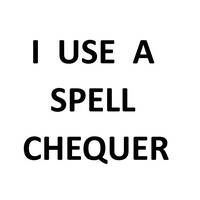 Not Yet Replaced By AI
Not Yet Replaced By AIThis transcription item is now locked to you for editing. To release the lock either Save your changes or Cancel.
This lock will be automatically released after 60 minutes of inactivity.